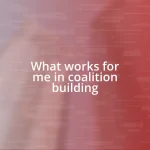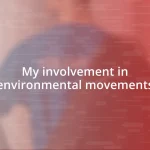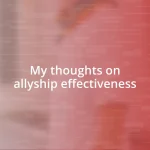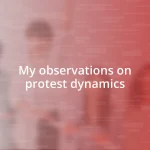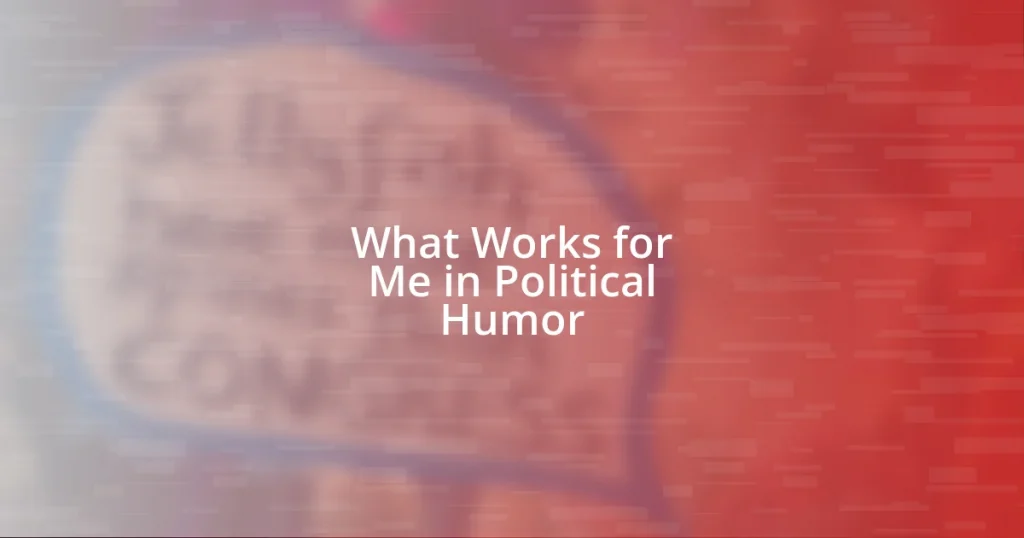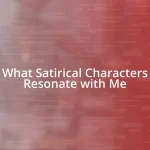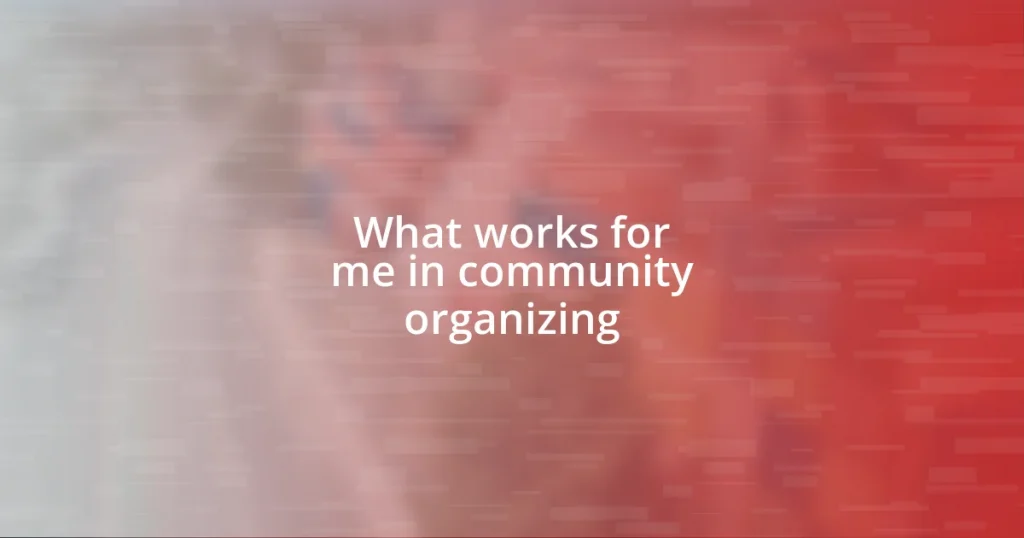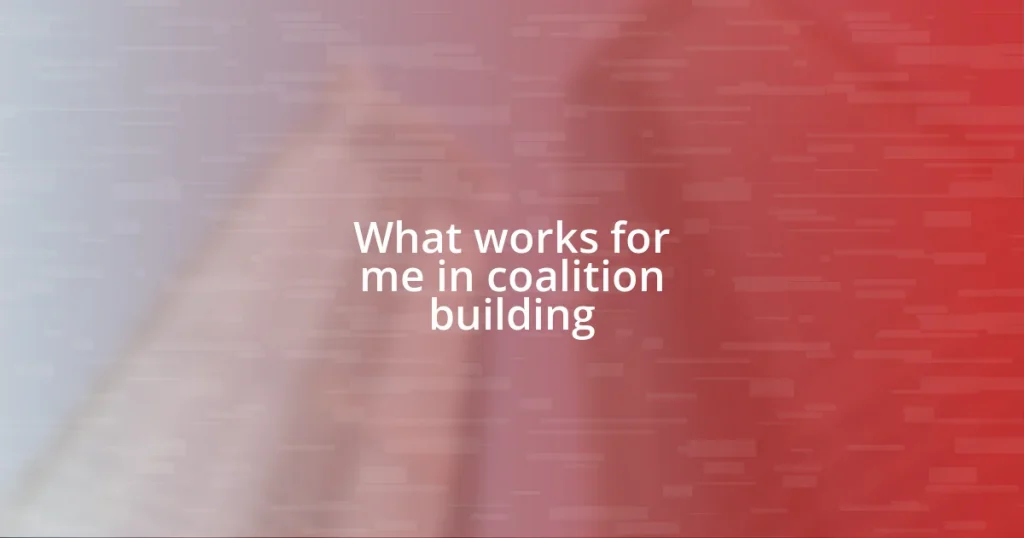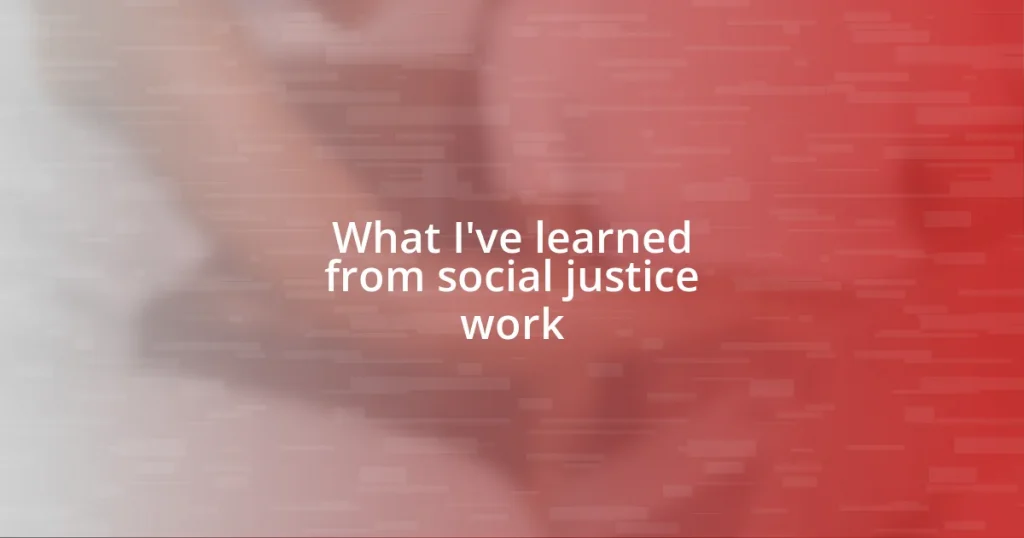Key takeaways:
- Political humor helps simplify complex issues, fosters connection during divisive times, and encourages critical thinking through satire and jokes.
- Identifying your unique humor style, including tone, content, and delivery, is essential for creating relatable and impactful political humor.
- Engaging with the audience responsively and learning from successful comedians enhances the effectiveness of humor, ensuring that it resonates with diverse audiences.
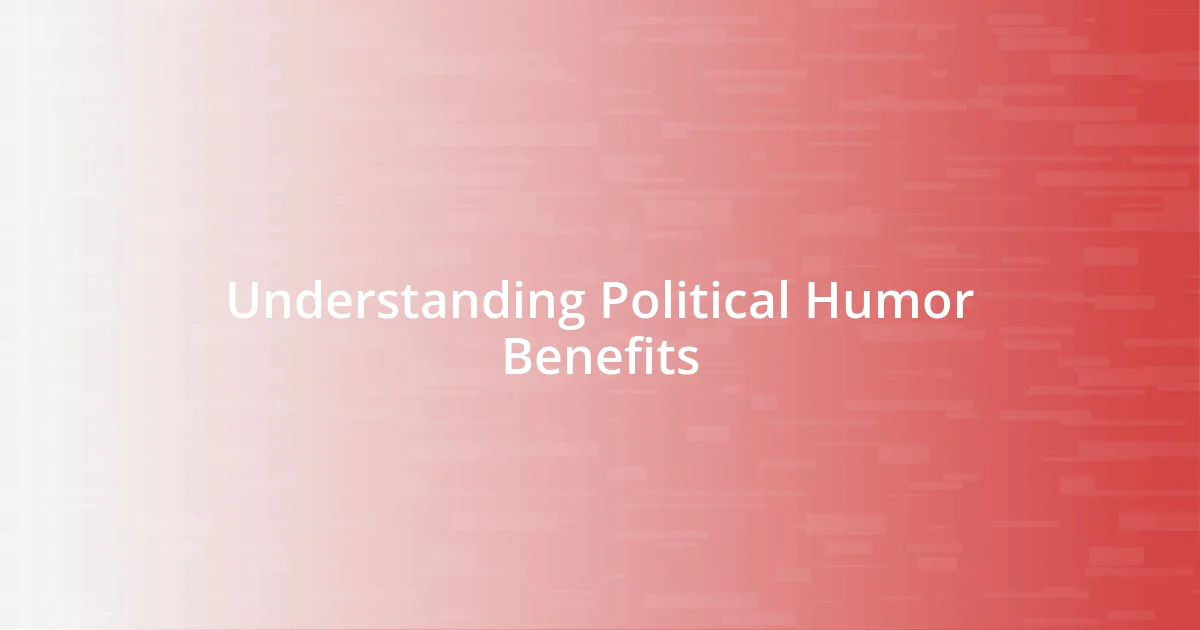
Understanding Political Humor Benefits
Political humor serves as a vital tool for dissecting complex issues and making people feel more connected to them. I remember watching a satirical news show that brilliantly unpacked a convoluted policy debate. The laughter made the information not only digestible but also memorable, showing how humor can bridge gaps in understanding.
Additionally, I’ve noticed that humor can act as a unifying force in divisive times. During an election cycle, a well-timed joke can light up the tension in the room, creating a shared moment that draws people together, even when they have different views. Have you ever felt that shift in mood when a clever quip lands just right?
Moreover, political humor encourages critical thinking. It invites us to question what we see and hear, prompting discussions that go beyond surface-level engagement. I often find myself reflecting on the deeper implications of a satirical take; it pushes me to analyze not just the punchline but the context behind it. Isn’t it fascinating how a laugh can lead to greater understanding?
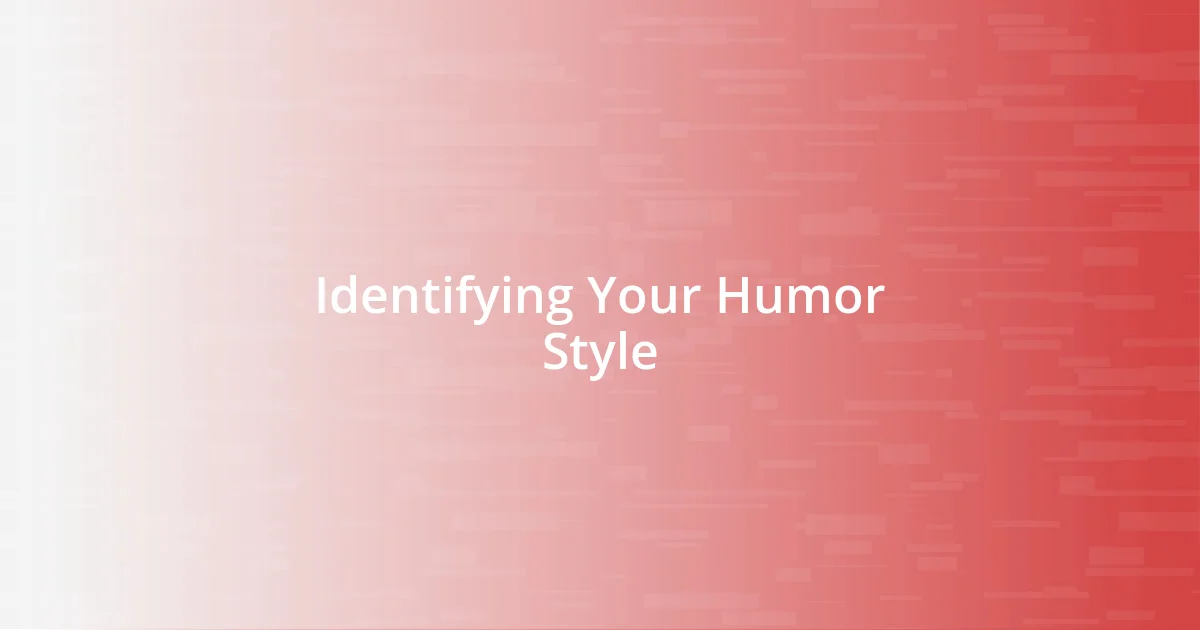
Identifying Your Humor Style
Identifying your humor style is crucial in creating political humor that resonates with your audience. For me, recognizing my own preferences—whether I lean towards satire, irony, or absurdism—has made a significant difference in how I craft jokes. I recall a time when I tried out a series of witty one-liners at a social gathering, only to realize that the audience responded better to stories with a humorous twist. That experience really drove home the importance of knowing what kinds of humor connect with people.
When thinking about your humor style, consider these aspects:
– Tone: Do you prefer light-hearted jokes, or do you lean towards darker, more sardonic humor?
– Content: Are you drawn to political satire, observational comedy, or perhaps witty repartees?
– Delivery: Do you enjoy verbal quips, or is your strength in written humor?
– Cultural References: Is your humor rooted in shared cultural knowledge, or do you prefer relatable, everyday experiences?
By reflecting on these elements, you can discover what makes you laugh and, in turn, what might resonate with your audience.
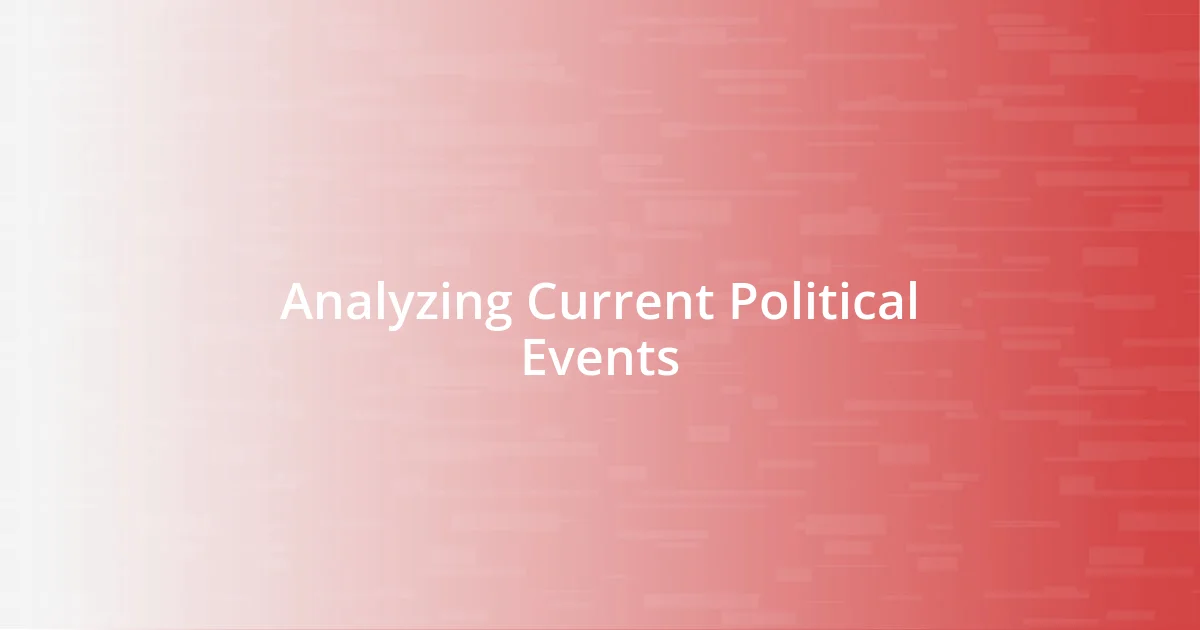
Analyzing Current Political Events
Analyzing current political events through the lens of humor can be incredibly illuminating. I remember the uproar over a viral political meme that cleverly highlighted a recent gaffe by a politician. The humor resonated not just because it was funny but also because it succinctly captured public sentiment—often, a joke can encapsulate a complex situation far better than a lengthy article. This ability to condense information into humor is something that I find truly powerful.
On another occasion, I watched a late-night show tackle a major political scandal. The way the host used satire to address serious aspects made the information feel less daunting. In that moment, I realized humor creates a safe space for us to confront uncomfortable truths. It’s almost like being invited to a discussion without the fear of judgment. Perhaps you’ve found similar comfort in political humor, too?
As I observe political events unfold, I often jot down notes of absurd statements made by public officials. Sometimes, the outlandishness of the commentary is so striking that it practically begs for parody or satire. Have you also felt that these moments, while serious, also provide goldmine opportunities for humor? It seems to me that laughter not only eases stress but also fosters critical dialogue about the underlying issues. Instead of brushing off these moments, I embrace them and use them as a springboard for deeper discussions.
| Event | Humorous Insight |
|---|---|
| Viral Political Meme | Condenses public sentiment into a humorous snapshot of a complex situation |
| Late-night Scandal Satire | Creates a safe space to confront serious topics through comedy |
| Absurd Political Commentary | Presents an opportunity for parody, enhancing critical dialogue |
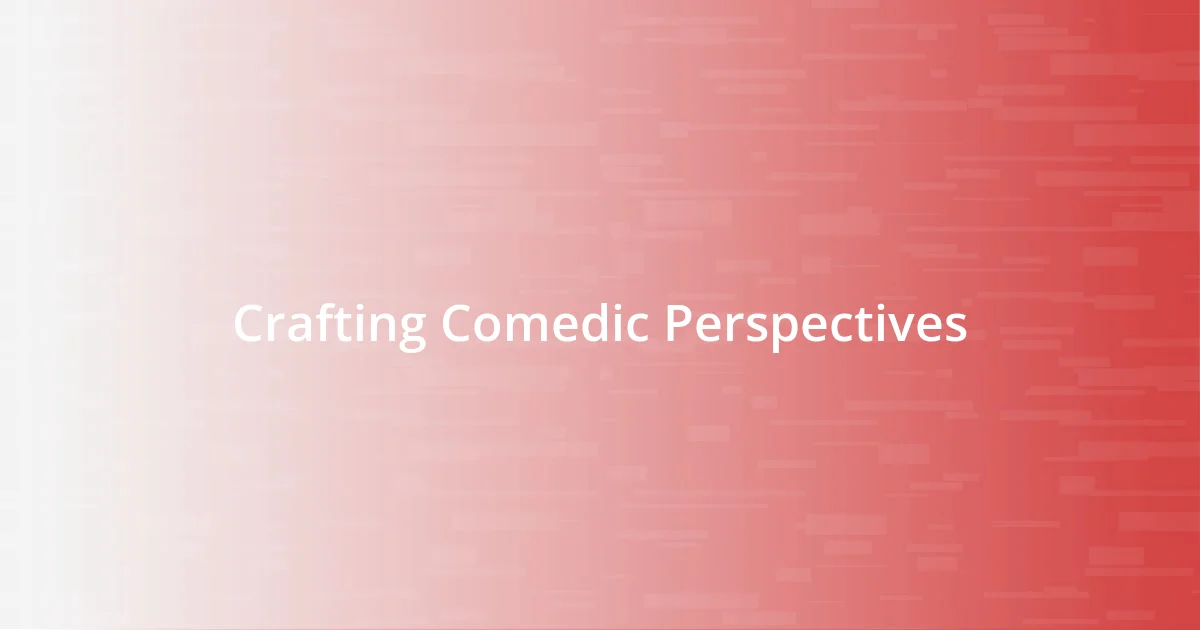
Crafting Comedic Perspectives
Crafting a comedic perspective begins with the core understanding of what makes something funny to you. I remember crafting a bit about a politician fumbling their words during a speech, exaggerating the moment to the point where it felt surreal. It wasn’t just the joke itself that made people laugh; it was the shared frustration we all felt during the word salad. Have you ever noticed how a well-placed punchline can transform awkward moments into something hilarious? It’s that interplay between reality and exaggeration that transforms a simple observation into comedic gold.
Thinking about the audience can also reshape a joke into something more relatable. I once used an everyday scenario—misplacing my keys during a chaotic election season—to illustrate the confusion we often feel with political messaging. As the audience chuckled, I realized the humor in our collective experience of feeling overwhelmed resonated far more than the specifics of any political event. It’s fascinating how ordinary moments can draw laughter while simultaneously inviting deeper reflections—we can laugh at ourselves even as we tackle heavier themes.
When I create political humor, I often ponder why certain topics hit harder than others. For instance, I recall crafting a pun around a widely-reported political faux pas. I thought to myself, “Why does this situation elicit such strong reactions?” The answer lies in our shared experiences and unique identities. Each punchline can open the door to insights about social norms, beliefs, and fears, proving that humor is not merely for laughter; it’s a vehicle for connection and understanding. Have you felt that connection through your own comedic approaches? It’s moments like these that remind me of the profound impact humor can have on public discourse.
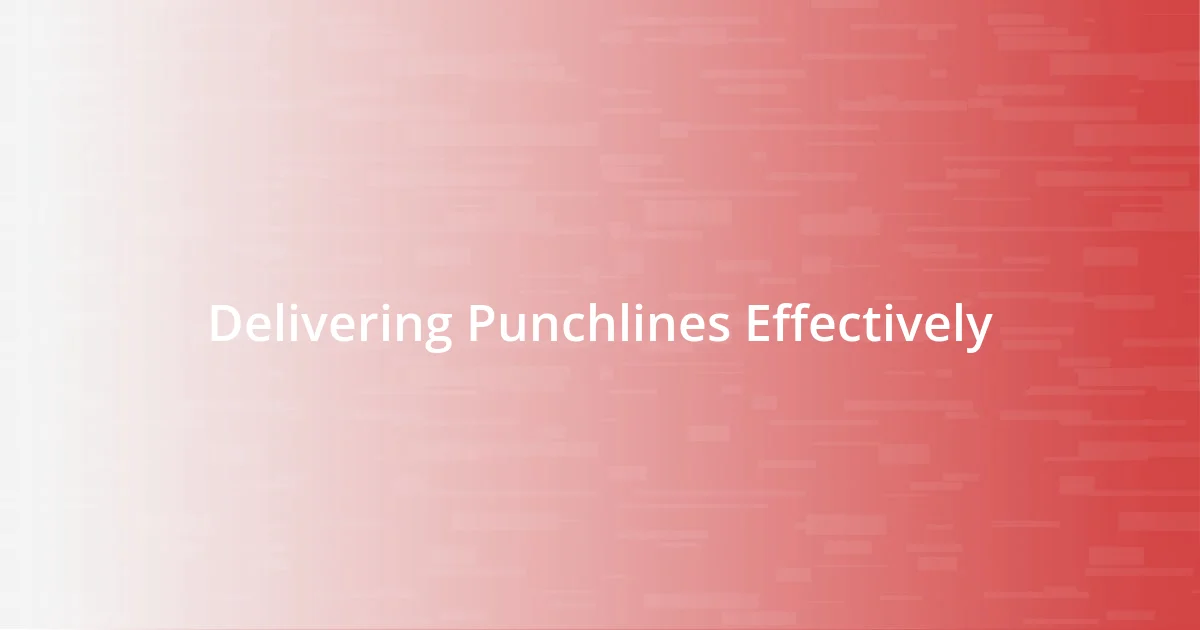
Delivering Punchlines Effectively
Delivering a punchline effectively hinges on timing and context. I once tried out a joke about a politician’s bewildering statement at a community event, and the laughter took a moment to build. It hit me then—sometimes the best punchlines land after a slight pause, allowing the audience to digest what they just heard before the humor sinks in. Have you ever felt that suspense in a joke that made the punchline hit harder?
Another crucial aspect is clarity. I remember fumbling through a complex joke about governmental policies that left my audience scratching their heads. It was a tough lesson; if the audience can’t easily grasp the setup, they’ll likely miss the punchline altogether. Simplifying the setup not only keeps the audience engaged but also ensures they’re primed to appreciate the humor. Isn’t it amazing how a bit of clarity can transform the delivery?
Finally, delivery isn’t just about the words; it’s about the energy you bring. I once attended a comedy show where the comedian’s enthusiasm was infectious, enhancing even the simplest of punchlines. I realized that if you’re genuinely excited about the joke, it encourages the audience to lean in and share that enthusiasm. How do you project your excitement in your own humor? It’s moments like these that confirm for me the undeniable magic of a well-timed punchline.
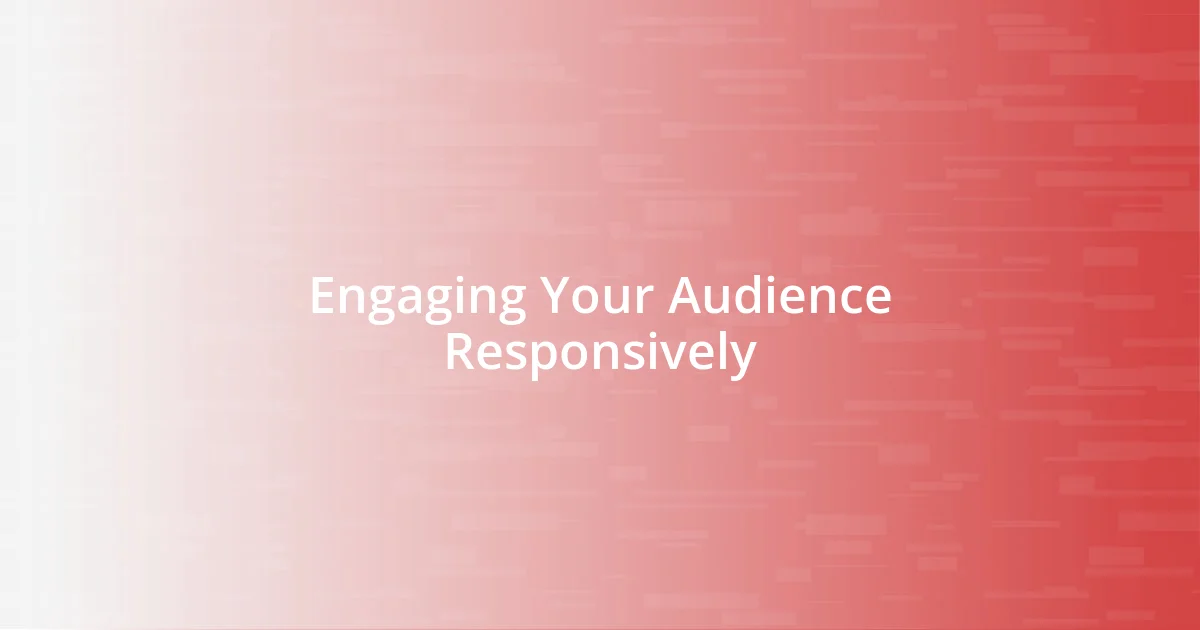
Engaging Your Audience Responsively
Engaging your audience responsively means tuning into their reactions and adapting your humor on the fly. I recall a night at an open mic where I started with a lighthearted joke about election season stress. The audience was initially quiet; their hesitant chuckles indicated they were still warming up. So, I pivoted to a more relatable quip about navigating complicated ballots, leading to an eruption of laughter. This experience underscored to me how vital it is to read the room and respond to your audience’s mood.
I often find that incorporating instant feedback can enhance my performance significantly. For instance, during a recent gig, a spectator made a witty comment about a new political scandal. Instead of ignoring it, I integrated that playful jab into my next joke. The audience loved the spontaneous twist, creating a shared moment that felt authentic and alive. Do you find that spontaneity adds an exciting element to your performances? That connection speaks volumes about the power of engaging in real-time, reinforcing the idea that a responsive approach brings the audience along for the journey.
Sometimes, it’s about gauging different aspects of the audience’s experience. During one performance, I noticed a diverse crowd ranging from politically savvy individuals to casual listeners. I consciously adjusted my references to ensure everyone felt included, using a simpler setup that blended humor with familiar themes. Tailoring my approach reminded me that humor can serve as a bridge, uniting various perspectives within a shared context. Isn’t it fascinating how adapting to your audience can deepen the impact of your humor? It’s moments like these that completely reshape the dynamics of a comedy set.
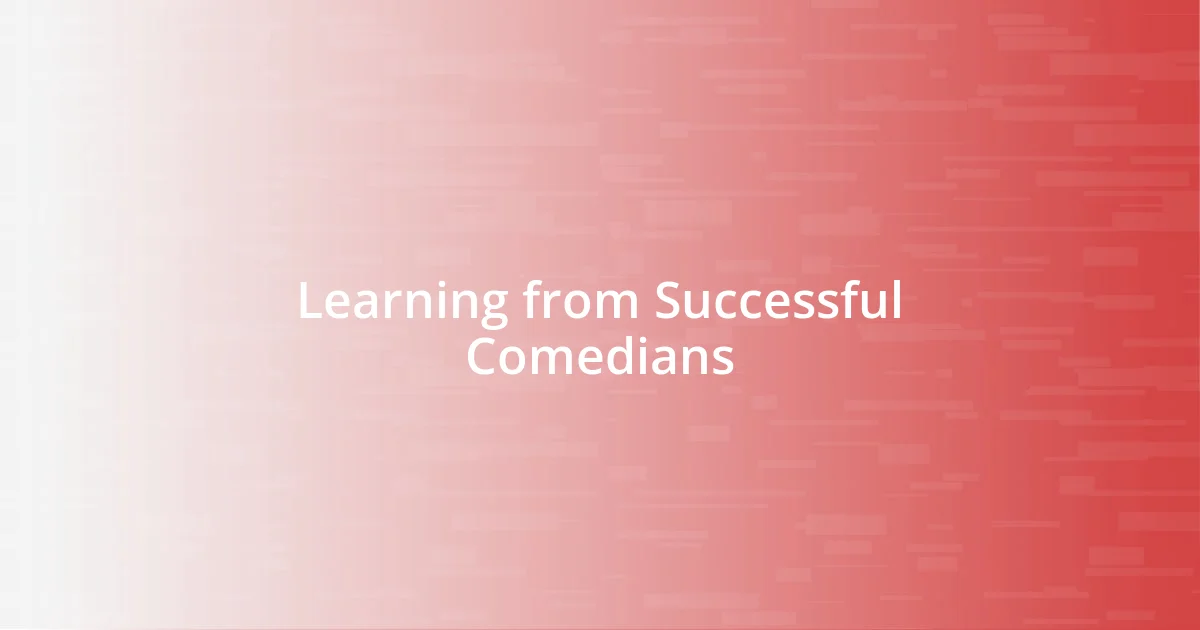
Learning from Successful Comedians
Learning from successful comedians is like uncovering a treasure trove of techniques that can elevate your political humor. I remember watching a seasoned comedian dissect a recent political event; his knack for weaving personal anecdotes into the critique made the humor relatable and memorable. Isn’t it incredible how a personal touch can turn a political jab into a shared experience that resonates with everyone?
I’ve also noticed that successful comedians often master the art of pacing. There was a time I rushed through a set, eager to deliver punchlines without pausing for effect. After watching a comedy special, I realized that sometimes, simply slowing down allows the audience to anticipate the punchline, which magnifies the laughter. Have you ever noticed how suspense can amplify the impact of a joke? It’s a reminder that timing is everything in the world of comedy.
Furthermore, observing how these comedians handle controversial topics has been enlightening. I once attended a show where the comic tackled a divisive political issue and did so with a blend of insight and humor. The way he acknowledged sensitivities while still delivering sharp wit showed me the importance of balance in comedy. It encourages me to ask—how can we embrace touchy subjects while making people laugh? This delicate dance is what great comedians do best, and it’s a lesson I strive to apply in my own comedic endeavors.

